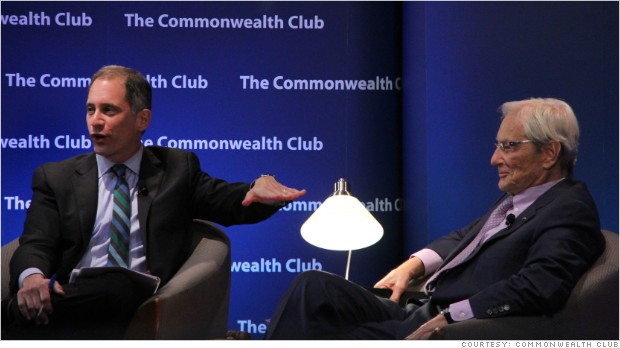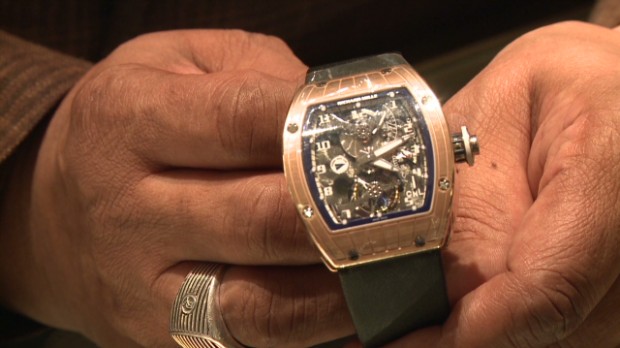
Fortune's Adam Lashinsky and Tom Perkins during an appearance Thursday in San Francisco.
SAN FRANCISCO (CNNMoney) Tom Perkins -- venture capitalist and co-founder of the VC firm Kleiner Perkins Caufield & Byers -- spoke with Fortune's Adam Lashinsky at San Francisco's Commonwealth Club Thursday night.The event, entitled "The War on the 1%," focused on the issue of income inequality. Perkins, 82, not only revealed his opinions on social, fiscal, and monetary policy, but he also clarified his views on how taxes are being used as a weapon against the wealthy 1% as a whole.
Perkins' infamous Jan. 24 letter to the editor published in the Wall Street Journal compared modern discrimination against America's rich to Nazi Germany's treatment of the Jews. He also claimed that the 1% currently faces a "rising tide of hatred" akin to Kristallnacht. He has since apologized for his extreme comparison, and he said at the event, "Kristallnacht should never have been used. The Holocaust is incomparable." However, Perkins maintained his stance that the wealthy are persecuted, particularly in San Francisco where the Occupy movement, outrage over city gentrification, and protests against Google employee buses illustrate a "demonization of the rich."
Ultimately, the biggest issue Perkins claimed to have with the treatment of the 1% is taxes. "I wouldn't say taxation is a form of persecution," he said. "But the extreme progressivism of the tax system is." He cited statistics about the tax contributions that wealthy Americans make -- including that the top 1% pays more taxes than the bottom 90% combined --and said that the top 1% is carrying the government. "Government is a giant beast that has to be fed, and it's fed with taxes," he said. "And taxes will go up and up and up."
Perkins pegged the problem of the American taxation system on failures in social, fiscal, and monetary policy. The income gap has roots in the War on Poverty, Perkins said, which he wished "had not been such a fiasco." He blamed Lyndon B. Johnson's social programs for an increase in out-of-wedlock birthrates and low-income single parent households. Fiscally, Perkins said that the government spends too much money on entitlement programs, an issue highlighted by the debt that the U.S. accrues as a result. "We're on a knife edge with this incredible debt that can't be paid back," Perkins said. Finally, Perkins views on monetary policy were that historically low interest rates have led to a boom in tech startups. Which, according to Perkins, is a bad thing. "An incredible amount o! f money has flowed into venture capital," he said. So, when students drop out of college and move to Silicon Valley to start companies or design software, "There's so much money [in Silicon Valley], that they can keep failing and failing, so they aren't learning in college anymore."
 The $350k watch worth 69 Rolexes
The $350k watch worth 69 Rolexes Up until the evening of the event -- which Perkins said offstage will probably be his last -- the series of dramatic exchanges between Perkins and the press led Kleiner Perkins and other venture capitalists to distance themselves from his inflammatory statements. "Tom Perkins has not been involved in KPCB in years," Kleiner Perkins tweeted after the letter was published. "We were shocked by his views expressed today in the WSJ and do not agree." Perkins was disappointed by KPCB's response. "They could have chosen not to say anything, but instead they threw me under the bus," he said at the event.
When challenged to say, in 60 seconds, how he would change the world, Perkins made a playfully controversial response. He suggested that, in the tradition of Thomas Jefferson's voting land owners and Margaret Thatcher's idea of only allowing taxpayers to vote, "The Tom Perkins system is: you don't get the vote if you don't pay a dollar in taxes. But what I really think is it should be like a corporation. You pay a million dollars, you get a million votes. How's that?" To which the audience responded with laughter. Perkins later said offstage that what he meant was that, with 50% of registered U.S. voters not paying taxes, "we got ourselves into a mess."
Though Perkins apologized for the use of his Holocaust analogy, he did circle back to the reason for his original thinking at the event. "I think the parallel holds," he said. "The typical Germa! n had nev! er met a Jew." To which Lashinsky suggested, "So perhaps the typical Occupy protester has never met someone who rides a Google bus."
The last question an audience member asked at the end of the event was what the 1% fears. While the Jews of Nazi Germany feared deportation and extermination, what was it that made Perkins afraid of "the war on the 1%?"
Perkins said the fear is higher taxes until there is no 1%. "It's an economic extinction, not a physical one." ![]()
No comments:
Post a Comment